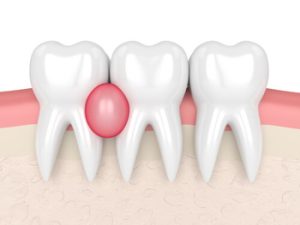If you’ve noticed a swollen, painful bump on your gum that feels tender to the touch, it could be a gum abscess. In moments of discomfort, many people wonder, should I pop an abscess on my gum? It might seem like a quick fix to relieve pain, but this decision can lead to serious complications.
This guide will explore what a gum abscess is, what causes it, the risks of popping it yourself, and the proper treatment paths to follow. We’ll also walk you through how to care for your gums after an abscess and ways to prevent it from happening again.
What Is a Gum Abscess and Why Does It Happen?
A gum abscess, also known as a periodontal abscess, is a painful collection of pus caused by a bacterial infection in the gum tissue. It’s your body’s way of responding to an infection that has formed around a tooth, often due to gum disease, poor oral hygiene, or an infected tooth.
There are different types of dental abscesses:
- Periodontal abscess: Forms in the gums beside a tooth, typically due to gum disease or trapped food particles.
- Periapical abscess: Forms at the tip of a tooth’s root, often due to tooth decay or trauma.
- Gingival abscess: Occurs only in the gum tissue without affecting the tooth or periodontal ligament.
Regardless of the type, an abscess located in your mouth should be taken seriously.
Why You Shouldn’t Pop a Gum Abscess
It Might Seem Harmless, But It’s Risky
Many people think that popping an abscess will help relieve pain and pressure. While it might offer temporary relief, it also introduces dangerous risks.


- Spreading the infection: When you pop a gum abscess, you risk pushing the bacteria deeper into surrounding tissues. This could lead to a more severe infection or life threatening conditions like sepsis.
- Incomplete drainage: A dental abscess contains pus, but also infected tissue. Without proper treatment, like a small incision by a skilled dentist, some of the infection may remain trapped and grow worse.
- Delaying the real solution: Popping the abscess only masks the problem. It doesn’t treat the underlying infection, which continues to damage your gum tissue, teeth, and potentially the jawbone.
- Introducing new bacteria: Attempting to pop the abscess with unsterile tools or fingers can worsen the bacterial infection and lead to further complications.
Signs and Symptoms of a Gum Abscess
Understanding the symptoms helps you identify when to seek professional help. Here are some signs of a dental abscess:
- Swelling or a pimple like bump on the gums
- Red, inflamed, or bleeding gums
- Throbbing pain near the affected tooth
- Pain that worsens with hot or cold foods
- Bad taste in your mouth from draining pus
- Swollen lymph nodes or fever in severe cases
- Loose teeth or sensitivity in the affected area
If your gum abscess pops on its own, rinse your mouth gently with warm salt water and seek professional dental care immediately.
What Causes a Dental Abscess?
Abscesses usually result from poor oral hygiene or untreated gum disease. Here are common causes:
- Tooth decay that reaches the tooth pulp
- Bacterial buildup under the gumline
- Trapped food or debris between the teeth and gums
- Poor dental hygiene or skipping cleanings
- Cracked or broken teeth exposing the pulp
- Gum surgery complications
- Weakened immune system or uncontrolled diabetes
In most cases, when left untreated, these issues escalate into infections that form an abscess.
What You Should Do Instead
See a Dentist Immediately
Only a professional treatment plan can truly drain the abscess, treat the underlying infection, and prevent complications. A dentist may take one or more of the following steps:
- Examine the affected tooth and take X-rays to assess the extent
- Use a sterile method to drain the abscess
- Prescribe antibiotics to control the infection
- Recommend a root canal if the pulp is infected
- Perform a tooth extraction if the tooth is beyond repair
- Conduct deep cleaning for a periodontal abscess
- Suggest surgery in rare or advanced cases
Never try to pop a gum abscess yourself. Always trust professional dental care to ensure the infection is fully treated.
How to Relieve Pain While Waiting for Treatment
If you can’t get to the dentist right away, there are a few things you can do to manage discomfort safely:
- Rinse with warm salt water to reduce inflammation and bacteria
- Apply a cold compress to the outside of your cheek to ease swelling
- Use over-the-counter pain relievers as directed
- Avoid sugary foods, alcohol, and hot or cold foods
- Keep the area clean without brushing too hard
These methods offer temporary relief, but they are not a substitute for professional treatment.
What Happens If a Gum Abscess Is Left Untreated?
Ignoring a gum abscess is risky. The infection can spread to:
- Surrounding gum tissue and teeth
- Jawbone and sinus areas
- Bloodstream, leading to sepsis (a life threatening condition)
Other possible serious complications include:
- Tooth loss
- Bone damage
- Chronic pain and swelling
- Difficulty eating or speaking
If you’re experiencing fever, facial swelling, or difficulty breathing, visit the nearest emergency room immediately.
Preventing Gum Abscesses in the Future
Prevention starts with good oral hygiene and regular dental visits. Here’s how to reduce your risk:
- Brush and floss daily to remove plaque and food debris



- Avoid sugary foods and drinks that promote tooth decay
- Use antiseptic mouthwash to reduce bacteria
- Schedule cleanings and checkups every six months
- Treat gum disease early
- Avoid tobacco use
- Follow through with any dental treatment plans your dentist recommends
Practicing excellent oral hygiene is your best defense against recurring dental abscesses.
FAQs
What should I do if my gum abscess pops on its own?
Rinse your mouth gently with warm salt water and contact your dentist immediately for further care.
Can I treat a gum abscess at home with antibiotics?
Over-the-counter antibiotics are not recommended. You need a dentist to prescribe the correct treatment and ensure proper drainage.
How long does it take for a dental abscess to heal after treatment?
With proper care, pain usually subsides within a few days, but full healing can take 1 to 2 weeks, depending on the severity.
Are gum abscesses contagious?
No, but the bacteria that cause them can spread through saliva, so it’s best to avoid sharing utensils or drinks.
Is a gum abscess an emergency?
Yes, especially if accompanied by fever, swelling, or difficulty breathing. Seek immediate care if symptoms worsen.
Final Thoughts: Let the Professionals Handle It
So, should you pop an abscess on your gum? The answer is a definite no. While it might seem like a quick fix, the risks far outweigh the temporary relief. An abscess is a sign that something deeper is wrong. Only professional care can target the root cause, drain the abscess safely, and guide your healing journey. For expert treatment and safe relief from dental abscesses, trust the Roseville Dentist for Full-Service Dental Care in Nearby Killara, NSW.
If you’re dealing with a gum abscess, don’t wait for it to get worse. Contact your dentist right away to ensure your mouth stays healthy, comfortable, and infection-free.
References:
https://my.clevelandclinic.org/health/diseases/24573-periodontal-abscess
https://www.nhs.uk/conditions/dental-abscess/
https://www.healthline.com/health/gum-abscess
https://myhealth.alberta.ca/Health/aftercareinformation/pages/conditions.aspx?hwid=abk6185
https://www.medicalnewstoday.com/articles/gum-abscess

